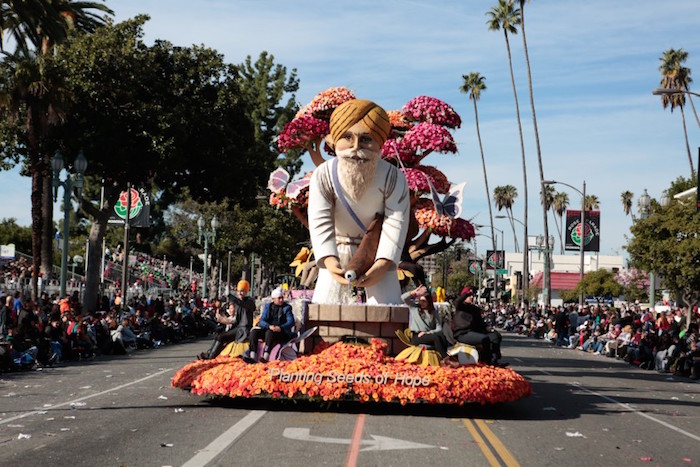
By ERIN B. LOGANSTAFF WRITER | LOS ANGELES TIMES |
For the sixth year in a row, the Sikh American Float Foundation motored a float down the 5½-mile parade route. This year, coffee grounds, lentils, walnuts, cranberries, spices and coconut flakes adorned the 85-foot-long float, titled “Planting Seeds of Hope.”
Maninder Minu Singh, creative director of the foundation, began thinking about the float’s design a year ago. She had to think of a way to connect this year’s parade theme, “The Power of Hope,” with the Sikh faith. Eventually, Singh settled on a large sculpting of Bhai Ghaneya Singh Ji, a Sikh from the 18th century known for giving water to wounded soldiers on the battlefield regardless of faith.
With the Irwindale-based Phoenix Decorating Co., Singh and 1,400 volunteers were able to bring to life a man who exemplified what the world should be, she said, “putting humanity above affiliations and differences.”
The float shows Ji pouring water, surrounded by 69,000 live roses and 16 real-life children. The presence of children from different backgrounds was important to showcase, Singh said, because they are the future of the world.
“If we plant seeds of love, compassion and service into young minds today, then they can design a world in the future that is more peaceful, kind, loving and beautiful,” she said.
An estimated 500,000 Sikhs live in the United States. The religion has roots in the 15th century Punjab region of India.
Some people wrongly assume that Sikhs are Muslims because of the turbans they wear. Violence against American Sikhs intensified after 9/11, when Islamophobia was on the rise.
In 2012, six people died in a mass shooting at a Sikh temple in suburban Milwaukee.
Recently, reports of hate crimes against the group have increased. In 2015, the FBI recorded six reports of hate crimes against Sikhs. In 2018 there were 60, a 200% increase from the 20 reported in 2017, according to figures provided by Brian Levin, director of the Center for the Study of Hate & Extremism at Cal State San Bernardino.
“Sikhs are attacked not only because they are confused with Muslims, but also because their adherents are doubly stereotyped” as part of a “foreign” faith, Levin said in an interview. He noted that changes in law enforcement data collection and the “excellent outreach made by the Sikh community” contributed in part to the dramatic increase in reports.
Local Sikhs see the parade as an educational opportunity. Having a float that showcases diversity and works with non-Sikhs, like Lhotka, is key to spreading a message of kindness and compassion, Singh said.
“At the end of the day, we all believe in freedom, equality, compassion and service,” she said. “Those are the things necessary to blur the lines of division and bring us together.”
See original report , Rose Parade 2020: Sikhs roll out a float to sow seeds of hope, generosity and harmony, here.
RELATED STORY:
Sikh float at 2016 Pasadena Rose Parade (Asia Samachar, 3 Jan 2016)
ASIA SAMACHAR is an online newspaper for Sikhs / Punjabis in Southeast Asia and beyond. Facebook | WhatsApp +6017-335-1399 | Email: editor@asiasamachar.com | Twitter | Instagram | Obituary announcements, click here |
































